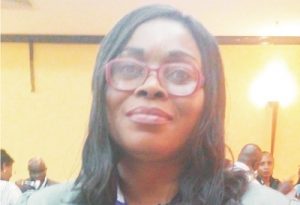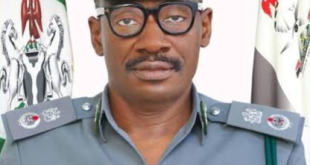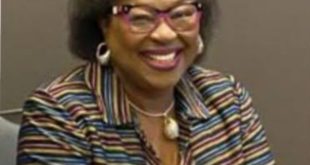
It was a chance encounter that served a mutual interest. Before now I never knew there was an Institution called Nigerian Institute of Chartered Arbitrators. I sighted a lively fellow, who was really ready to talk and talk sense. And I was really ready to make the best of the Conference, to project the organizers. She came handy and surprisingly, she was a good material and knowledgeable in her calling. Meet Mrs. Shola Oshodi-John, Acting Registrar/ Chief Executive Officer (CEO) of the Institute. In this chat, she examines the Rotterdam Rules, how it affect the local content regulations, how arbitration and mediation could help to fight recession, and more. Excerpts.
We have seen that the Rotterdam rules is a synthesis of the Hague and that of Hamburg rules, how can arbitration be integrated here in conflict resolution?

Thank you very much for this opportunity. The Rotterdam rules like we all know is a new kid on block, it is an expansion of the previous conventions of both the Hague and Hamburg which dealt to a large extent about the rights of the shipper but it is not so extensive unlike what we have now in the Rotterdam rules. The Rotterdam rules is more comprehensive and very balanced when considering the rights and obligations between the shipper and that of the carrier and so to that extent, it is stirred to the right direction and I think it’s also beneficial to West Africa and other African nations that are mainly shipper nations which do most of importing of cargo even though the vessels do not really belongs to us.
So on that note, the Rotterdam rules is a good development and it’s able to also ensure that other countries which are land- lock are also beneficial from this new innovation of the rules. So we found out that land locked countries which have dry ports can also benefit from them. It also goes beyond just carriage of goods from one port to another port but also as far as door to door where the contract covers those legs of the transportation movement of the goods and so it’s a good development. Bearing that in mind, the other downside to it is that there need to be more consultation of the critical stakeholders to ensure that we are all on the same page, and that what we’re trying to do is not really a sink hole because some of the articles are not so clear in terms of drafting and interpretation. So it will be nice to know what is the extent of the obligations and of the rights of either a shipper or a carrier so that we open our eyes and enter into these conventions knowing that our interests are protected in all ramification.

From the legal perspective, I’m a member of a noble profession but today when it comes to commercial transactions, it is more of arbitration, and now we are now moving into mediation because we’re looking at speedy ways of resolving disputes and ensuring that the parties remain friends in their relationships and can still transact business even after that dispute. So if you know that arbitration is such that it enables the parties to go ahead and fulfill various obligations as well as putting aside whatever the contention is and resolve other things like there’s no contention at all, that’s the beauty of arbitration; an arbitration is better than where you have to go to court to and debate on the entire matter from beginning to end.
Also we’re talking about the time factor; in arbitration it is faster, you can go into arbitration and wrap everything up in four months if the arbitrators know all he should know and the parties as well are really ready to resolve the disputes. So, we make use of Arbitration. Mediation also is beginning to come second in terms of choice in resolving disputes but that notwithstanding, the people in legal profession like the lawyers and other practitioners of law have a role to play in the entire scheme at large. That is why for us, we look at it as a complementary mechanism; although we say today that arbitration, mediation, expert determination, etc, and all of that are alternative dispute resolution mechanism but to us, I believe it is complementary because you have various avenues open to you. If the parties are not willing to solve disputes by arbitration or mediation, they can go to the law court; so it’s not like the door is closed against mediation, it still boils down to what the parties want and the beautiful thing about it is that the parties have a choice and they can decide how they want to solve their disputes. Today in Nigeria, we are beginning to talk about the need to sensitize the average Nigerians, because so many people look at arbitration, litigation, as other means of resolving issues as elitist in terms of the practitioners and the promoters of this area of discipline of law. So we want to see how we can reach out to the average Nigerians and educate them that they don’t need to go to court because we know that in Nigeria, when they go to court they will never come back as friends; whereas they don’t really need to go to court when they can resolve this dispute amicably and still get what they want from themselves. You have a lot of family issues that have been taken to court and coming back from the court the family is divided and fallen apart. But if they go for mediation, the mediator can help them identify with the main issue that leads to the disputes that needs to be dealt with and put out all the envy in the matter and other factors that play out when parties are aggrieved that result in that disputes. We believe that as an institution in mediation, arbitration and other forms of dispute resolution mechanism outside litigation need to rise fully now especially at this time when we’re beginning to have pockets of conflicts all over the nation. It is true that some people can say that the conflicts in the Niger-Delta and North East is beyond mediation but I say that if from the very on sets, steps were taken to mediate between the aggrieved parties, I’m sure that the Boko Haram side would not have risen to where it has now and the same thing with what is going on now in the Niger- Delta. It is a clarion call to all Nigerians especially our leaders and to the various ethnic groups and institutions that have stake in this, to look for ways to step in, intervene and try to manage peace; it’s going to be a snow wind situation if we allow the crisis facing us to grow into a monster that cannot be controlled either by the Niger- Delta agitators or by the Federal Government of Nigeria and at the end of the day, every Nigerian will pay for it whether you live in the Niger- Delta or in Lagos. You know there’s a tendency for us to behave like an ostrich, we cover our heads and forget that our back is open, forgetting that we will all suffer it so long as you’re a Nigerian or you live in Nigeria, we will all bear the consequences of it.
In other words, you’re saying that whatever rules we are adopting, it should be able to rectify and possibly domesticate the Rotterdam rules, looking at where arbitration and mediation will play the role in commercial transactions. Don’t you see the new rules as anti-local content?
That’s why I say more consultations need to be done before rectifying or adopting the Rotterdam rules. The beauty about the Rotterdam rule is that it is secondary to any existing legislation or convention that a host nation is a party to. So where the Rotterdam rules comes to play and we have conventions on these nations that deals with inland transportation, those conventions and legislations will supersedes the Rotterdam rules in terms of application…
This also means that a company may also decide to adopt a particular policy. Without recourse to Rotterdam rules and tell you he’s acting in line with a particular convention?
Well, it’s slightly different, the Rotterdam rules is applicable where it has to do with international trade but the local practices are subject to national laws and policies with those countries involved. So that’s where the difference comes into play. But I also think that Nigeria as a nation needs to strengthen the capacity of our local freight forwarders and carriers in terms of other transports like roads or rail and others to be able to deliver because we may not be able to enjoy the full benefit of the Rotterdam rules if we don’t develop our infrastructure; so it is very comprehensive, it goes beyond signing the rules, we need to work on our infrastructure and the number one infrastructure that will make the Rotterdam rules to work is the railway system. When it is fully back and in operation and the factors like tankers or containers falling on the roads will be eliminated. Thus, the carriers and the shippers at the end of the day are smiling.
Interesting! How much of the transport sector do you know?
Well, by the grace of God, I have some little knowledge here and there of the transport sector.
Ok, can you discuss anything about Ameachi’s tenure in office?
I will not be able to discuss that and I would like to make you understand that my position as the CEO of the Nigerian Institute of Arbitrators is that the institute is an institution for humanitarians, so we’re not interested in politics and political issues and we don’t comment on that….
Ok! Let me rephrase that, what is your assessment of the transport sector in the last one year?
Well I’ll say that the Federal Ministry of Transport is doing a very good job, and part of what we’re seeing is why we are here today; the conference now has gone from local to international and indeed the sub- region and we’re trying to ensure that the rightful things are done, and as it stands we find out that there is a lot of conversation going on now about transportation. There’s more enlightenment and some people are now willing to come into transport more than as it was before, we now have a lot of professionals from diverse fields now involved in the transport business in Nigeria. So I want to say kudos to the Federal Ministry of Transport, as well as the agencies under it like the Nigerian Shippers’ Council, NIMASA, Inland Waterways and many others. This is one time we’re seeing collaboration between the various agencies to put heads together and brainstorm together for the common good of Nigerians because if the transport system is working, Nigeria will be a major benefactor in it due to the major role that transportation plays in the economy like in the carriage of goods and humans as well as employment.
Ok! How old is your institute?
Well my institute is about 40 years by next year. You probably may not know much about us because of the re-branding process we have taken in time past.
Wow! This is a long time. I want to ask, how much of the impact have you given to Nigeria since existence?
I would like to say that one impact we have given to Nigeria is to expand the scope of arbitration in Nigeria. Initially there used to be this error that arbitration is only an international affairs, so what we have come to do is to debunk the myth about arbitration that it’s not only an international thing and one does not need to become a lawyer to become an arbitrator. What is needed is to apply for any of the institution to get experience, be trained, write the examinations and become a professional after which you get certified; but of course also, getting the certificate alone cannot qualify you enough, you need to practice and do stuffs like apprenticeship so as to get more exposure. In fact mediation has been an old practice in Nigeria so actually this thing we are doing is just to set up that standards for mediation and arbitration. So our institutions has been resolving several issues in Nigeria and in Lagos, we have the Lagos Court of Arbitration in Lagos that has been set up by the business committee and supported by the Lagos State Government that is standard in any area you can think of.
I heard that your institution is having a rivalry from the one coming from britain, can you explain that?
Well, I won’t call that rivalry, we have a sister institute that is also into arbitration, more or less like a chapter over there but all the same, we see them as a sister organization because we are older and also see them as part of those Nigerians helping to foster the practice of arbitration. One most important thing I want to say again is that our institute has seen the need to organize a peer group sensitization about arbitration, we have to go out there massively to inform people about arbitration. By this, we hope to one day make Nigeria to be seen as a hub in the world, where other nations can see us as the number one country for dispute resolution in the world, this can also bring a lot of foreign exchange and investments into this country in the sense that foreign investors will see the country as a people who has the capacity and expertise to resolve disputes.
 MMS PLUS NG – Maritime, Aviation, Business, Oil and Gas News Online Newspaper with coverage in Maritime, Oil and Gas, Aviation, Power and Energy as well as Financial News
MMS PLUS NG – Maritime, Aviation, Business, Oil and Gas News Online Newspaper with coverage in Maritime, Oil and Gas, Aviation, Power and Energy as well as Financial News









